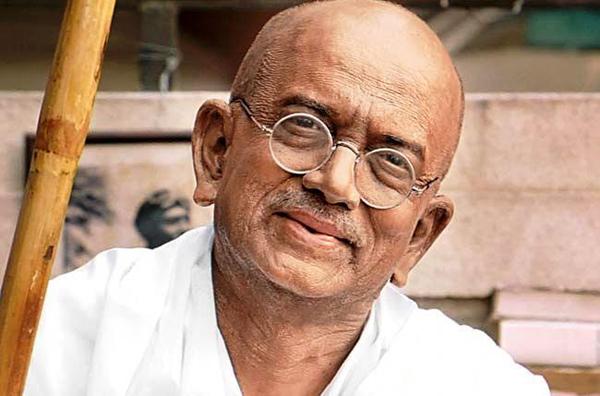 Image
Image
The Father through the lens
For millions of Indian children today, Gandhi is identified with the bald, bespectacled old man whose face appears in the currency note. Within this ambiance of anonymity and ignorance, Hindi cinema has succeeded to some extent in liberating the Father of the Nation from his captive anonymity frozen on rectangular pieces of paper to celebrate the principles he lived by. On the occasion of his birth anniversary, Shoma A. Chatterji looks at films on portrayal of Gandhi and on his ideologies
When Richard Attenborough made Gandhi (1982), no one would have thought Mahatma Gandhi would be a good bet to be played at high stakes in the Bollywood market. But times have changed. So have the average Indian filmmaker’s perception about Indian history. Gandhi seems to be omnipresent in many Indian films in terms of ideology, metaphor and message if not in terms of physical presence..jpg)
Shyam Benegal’s The Making of the Mahatma (1995) brought out the sacrifices a woman must make, albeit with reluctance, when she is married to a man with a mission. The film essayed a strong portrayal of Gandhi’s wife Kasturba (Pallavi Joshi). The personal conflicts between Gandhi and Kasturba often throw up the schism in the marriage, with Kasturba crusading relentlessly for the security and welfare of her sons, and the husband slowly evolving into more of a leader than a husband and father. The film, an Indian-South African co-production, was based on Fatima Meer’s The Apprenticeship of a Mahatma.
Kamal Hasan's Hey Ram (2000) is described a fictitious series of events that led to the assassination of an intriguing leader Saket Ram who vacillates between his faith in Gandhi and all that he stood for and his hatred for Gandhi he holds responsible for the friction between Hindus and Muslims that led to the Partition of India. His faith in Gandhi is restored when Gandhi is assassinated. The story unfolds in flashback from the point of view of Saket Ram’s grandson. Saiket Ram dies on the seventh anniversary of the destruction of Babri Masjid in Ayodhya. Of the films on the Mahatma Hey Ram happens to be the most confusing and ambivalent in approach to the leader through cinema.
Jahnu Barua’s Maine Gandhi Ko Nahin Mara (2005) presents Gandhi as a concept that is lost on Indians today. It revolves around the India afterGandhi and the failure of the ountrymen to live up to his dreams of patriotism, secularism, integrity and commitment. The film attempts to raise questions on the responsibility of an individual as citizen both for Gandhi's murder and for the people's subsequent failure to disseminate his ideas and his legacy to contemporary Indians. Recalls Anupam Kher about his pivotal role in the film, "I portrayed a retired professor who lives with his daughter and son in Mumbai. The film opens with his memory fading slowly, considered a 'natural' phenomenon for ageing people. But his dementia leads to another crisis – it brings back memories of a lost past, a trauma where he recalls being accused of having assassinated Mahatma Gandhi. The guilt comes back and as his present memories begin to fade, the past images become sharper. The more his life is whitewashed, the stronger this one memory remains.”
In the hit film Lage Raho Munnabhai (2006) where Gandhi appears as a motivational ghost in front of the atypical hero Munnabhai. Through his interactions with Gandhiji’s ghost, Munnabhai begins to practice Gandhigiri, a colloquial synonym for Gandhism to help ordinary people solve their problems. Gandhi metamorphoses into a symbol of social agenda for the maximum good of the maximum number with Munnabhai becoming the agency. The irony lies in that Gandhi known for his strict adherence to honesty and truth places his faith on the unlettered but well-meaning pathological liar Munnabhai to spread goodness among fellow-humans.
.jpg) “Gandhi has always been compelling, complex and strangely contemporary. I grew up understanding Gandhi through others till I discovered a deep wound he carried in his heart. Somewhere in the shadows of the great man lived his son, roaming the streets of India like a beggar. He converted to Islam and became Abdullah Gandhi as a rebellion, then reconverted to Hinduism as a penance, finally drinking himself to death. Mahatma Gandhi could transform the soul of a nation but could not save the soul of his own son,” said Feroz Abbas Khan, who directed the Anil Kapoor-produced Gandhi, My Father (2007), a tragic tale narrated from the perspective of his eldest son Harilal Gandhi.
“Gandhi has always been compelling, complex and strangely contemporary. I grew up understanding Gandhi through others till I discovered a deep wound he carried in his heart. Somewhere in the shadows of the great man lived his son, roaming the streets of India like a beggar. He converted to Islam and became Abdullah Gandhi as a rebellion, then reconverted to Hinduism as a penance, finally drinking himself to death. Mahatma Gandhi could transform the soul of a nation but could not save the soul of his own son,” said Feroz Abbas Khan, who directed the Anil Kapoor-produced Gandhi, My Father (2007), a tragic tale narrated from the perspective of his eldest son Harilal Gandhi.
Mohandas (2008) directed by cinematographer-director Mazhar Kamran is based on a real-life incident, turned into a novel by Uday Prakash. It narrates how in contemporary India, the values of honesty, integrity and non-violence Gandhi stood for have decayed so much that a young man who tries to live by these principles, is punished instead of rewarded for his goodness. The four things Mohandas has in common with Gandhi are – his first name, his honesty, his integrity and his pacifist attitude towards life. Born into a family of a very poor weaver, Mohandas tries to rise above his class with a good education. He becomes the first graduate in his community. He applies for a job at the Oriental Coal Mines in Annupur and is selected. When the call to report does not come, he goes to find out only to be thrown out. When he insists why, they bash him up and tell him that he is not the Mohandas he claims to be and that the real Mohandas has already filled up the vacancy!
There are very few true Gandhians alive who still practice and follow Gandhi’s ideology of peace, harmony and secularism. This year’s release Gour Hari Dastaan - The Freedom File is a feature film that illustrates, through a fictionalised account, the real struggle of a Gandhian named Gour Hari Das who still believes in, lives by and practices the teachings and ideology of Gandhi. Gandhi hovers like symbol, a message, a metaphor or as the real person is these films...jpg)
“Munnabhai to theek hai, yeh Mahatma Gandhi kaun hai?' ('Munnabhai is fine, but who is this Mahatma Gandhi?') This was a question a chai-wallah boy asked director Rajkumar Hirani when he was told that the crew was shooting for a film named Munnabhai meets Mahatma Gandhi, the original name of the film that was later changed. Have films evolving around Gandhi changed this perception? If it has changed the perspectives of the man on the street even a bit in terms of awareness, we have only Hindi cinema to be grateful to.
Top Headlines
-
Entertainment
Bollywood 2025: Hits, Hype and Heartbreaks as Dhurandhar Redefines the Year
December 24, 2025
-
Entertainment
Rotary Club of Calcutta East Central celebrates centenary of iconic actor Santosh Dutta with statue unveiling
December 04, 2025
-
Entertainment
Valentyn Vasyanovychs To The Victory! wins 2025 TIFF Platform Award unanimously
September 26, 2025
-
Entertainment
Chlo Zhaos Hamnet Wins TIFF 2025 Peoples Choice Award
September 20, 2025
-
Entertainment
Sholay: Golden even after fifty years
July 04, 2025
-
Entertainment
War 2: Check out Hrithik Roshan, Jr NTR and Kiara Advani's new posters
June 26, 2025
-
Entertainment
LGBTQIA+: Icelandic film Odd Fish and Brazil's Baby win big at KASHISH 2025 film festival
June 12, 2025
-
Entertainment
Katrina Kaif named Maldives tourism global brand ambassador ahead of Modi's visit
June 10, 2025
-
Entertainment
'Queen marches to conquer': Deepika Padukone joins Atlee's AA22xA6 starring Allu Arjun after 'Spirit' exit
June 08, 2025
-
Entertainment
Dakota Johnson and Chris Martin, who were in on-and-off relationship, broke up: Reports
June 06, 2025


